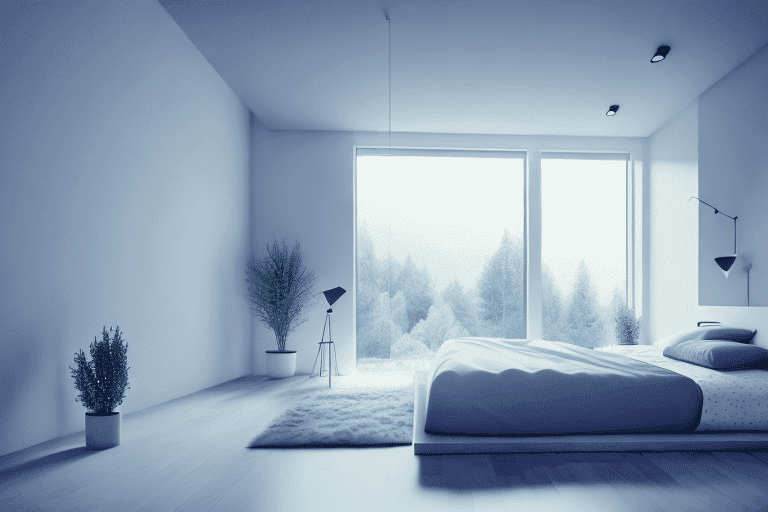UPDATED: March 17, 2024
Welcome to "The Science of Sleep: Tips for Improving Your Nightly Rest"! In this article, we'll explore the fascinating world of sleep and the various ways it impacts our health and well-being. We'll also delve into common sleep disorders, the role of diet and exercise in sleep quality, practical tips for improving your sleep, the impact of technology on sleep, and when to seek professional help. So, let's dive right in!
Understanding the Science of Sleep
Getting a good night's sleep is crucial for our overall health and well-being. Sleep plays a vital role in our physical and mental health, including cognitive functions, emotional well-being, and even our immune system. But how does it all work?
Delving deeper into the science of sleep reveals a fascinating world of intricate processes that occur while we rest. Our bodies enter a state of restoration during sleep, with various systems working in harmony to ensure our well-being. From cellular repair to memory consolidation, the tasks carried out during sleep are essential for our survival and thriving.
The Importance of Sleep for Health and Well-being
Sleep is not just a luxury; it's a biological necessity. While we sleep, our bodies repair damaged cells, our brains consolidate memories, and our immune system strengthens. Sleep deprivation, on the other hand, can lead to a range of health problems, including obesity, heart disease, and mental health issues.
Furthermore, the impact of sleep on our mental health cannot be overstated. Quality sleep is linked to improved mood regulation, stress management, and overall psychological well-being. The intricate dance between sleep and mental health highlights the profound influence of rest on our emotional resilience and cognitive abilities.
The Sleep Cycle: An Overview
Ever wondered why you cycle through different stages of sleep each night? It's because of the sleep cycle. The sleep cycle consists of four stages: NREM (non-rapid eye movement) sleep and REM (rapid eye movement) sleep. Each stage has its unique characteristics that contribute to different aspects of our well-being.
As we progress through the stages of the sleep cycle, our bodies undergo a series of physiological changes that are essential for our health. From deep restorative sleep in NREM stages to the vivid dreaming of REM sleep, each phase serves a specific purpose in ensuring our bodies and minds are rejuvenated for the day ahead.
How Sleep Affects the Brain and Body
During sleep, our brains process information, strengthen neural connections, and regulate emotions. Lack of quality sleep can impair cognitive function, making it harder to concentrate and learn. On a physical level, sleep is crucial for muscle repair, hormone regulation, and maintaining a healthy metabolism.
Moreover, the intricate relationship between sleep and our immune system highlights the crucial role of rest in protecting our bodies from illnesses. While we sleep, our immune system works diligently to fend off pathogens and maintain our overall health. Disrupting this delicate balance through sleep deprivation can leave us vulnerable to infections and other health issues, underscoring the importance of prioritizing rest for a robust immune response.
Common Sleep Disorders and Their Impact
While many of us occasionally struggle with sleep, some people face regular disruptions caused by sleep disorders. Let's explore some of the most common sleep disorders and their impact on our daily lives.
Understanding these sleep disorders is crucial in addressing the challenges they pose and finding effective solutions to improve sleep quality and overall well-being.
Insomnia: A Closer Look
Insomnia is the inability to fall asleep or stay asleep, which can have a significant impact on one's quality of life. It affects millions of people worldwide and can lead to daytime fatigue, decreased productivity, and mood disturbances.
Individuals with insomnia may experience racing thoughts, anxiety, or stress that contribute to their difficulty in falling asleep. Establishing a relaxing bedtime routine and creating a comfortable sleep environment are key strategies in managing insomnia.
Sleep Apnea: What You Need to Know
Sleep apnea is a condition characterized by interrupted breathing during sleep. It can result in snoring, frequent awakenings, and excessive daytime sleepiness. If left untreated, sleep apnea can increase the risk of cardiovascular diseases and other serious health issues.
Continuous Positive Airway Pressure (CPAP) therapy is a common treatment for sleep apnea, helping to keep the airways open during sleep and improve breathing patterns. Lifestyle changes, such as weight management and avoiding alcohol before bedtime, can also play a significant role in managing sleep apnea.
Restless Leg Syndrome and Sleep
Restless Leg Syndrome (RLS) is an uncomfortable sensation in the legs, often causing an irresistible urge to move them. This condition commonly occurs at night, leading to sleep disturbances. RLS affects both sleep quality and daytime well-being.
Engaging in regular exercise, practicing relaxation techniques, and maintaining a consistent sleep schedule can help alleviate the symptoms of RLS and improve sleep quality. Seeking medical advice for proper diagnosis and treatment is essential for individuals experiencing persistent RLS symptoms.
The Role of Diet and Exercise in Sleep Quality
What we consume and how active we are during the day can significantly impact our sleep quality. Let's explore some dietary choices and exercise habits that can contribute to better sleep.
When it comes to sleep quality, the relationship between diet and exercise is crucial. Not only can certain foods promote better sleep, but physical activity also plays a significant role in ensuring a restful night. Understanding how these factors intertwine can lead to improved overall well-being and a more rejuvenating sleep experience.
Foods That Promote Sleep
Certain foods contain sleep-promoting substances like tryptophan, magnesium, and melatonin. Incorporating foods such as bananas, almonds, and chamomile tea into your evening routine can help relax your mind and body for a restful night's sleep.
Additionally, warm milk, whole grains, and kiwi are also known for their sleep-inducing properties. These foods can help regulate sleep patterns and promote relaxation due to their unique nutritional content. By incorporating a variety of these options into your diet, you can create a bedtime routine that supports a peaceful and uninterrupted night's rest.
The Impact of Physical Activity on Sleep
Regular exercise has been shown to improve sleep quality. Engaging in physical activity releases endorphins, reduces stress, and tires out your body, making it easier to fall asleep and enjoy uninterrupted rest throughout the night.
Furthermore, the timing of exercise can also influence sleep patterns. While some individuals may benefit from vigorous workouts earlier in the day, others find that gentle yoga or stretching exercises before bedtime can promote relaxation and prepare the body for sleep. Understanding your body's response to different types of physical activity can help you tailor your exercise routine to optimize your sleep quality.
Practical Tips for Improving Your Sleep
Now that we've explored the science behind sleep and its impact on our health, let's dive into some practical tips for enhancing your sleep quality.
Sleep is a vital component of overall well-being, affecting everything from cognitive function to mood regulation. By prioritizing good sleep hygiene, you can optimize your physical and mental health.
Establishing a Sleep Schedule
Your body loves routine, especially when it comes to sleep. Maintaining a consistent sleep schedule helps regulate your internal clock, making it easier to fall asleep and wake up feeling refreshed. Try to go to bed and wake up at the same time each day, even on weekends.
In addition to setting a regular bedtime, it's also beneficial to establish a relaxing pre-sleep routine. Engaging in calming activities like reading a book, taking a warm bath, or practicing gentle yoga can signal to your body that it's time to wind down.
The Importance of a Sleep-friendly Environment
Your sleep environment plays a significant role in the quality of your rest. Make sure your bedroom is cool, dark, and quiet. Consider investing in a comfortable mattress and pillow that support your body. Eliminate distractions, such as electronics, and create a calming ambiance that promotes relaxation.
Incorporating elements of nature into your sleep environment can also enhance your rest. Adding plants known for their air-purifying qualities, such as aloe vera or lavender, can improve air quality and create a soothing atmosphere conducive to sleep.
Relaxation Techniques for Better Sleep
Unwinding before bed is crucial for a restful night's sleep. You can try relaxation techniques such as deep breathing exercises, gentle stretches, or even mindfulness meditation. These practices can help calm your mind, release tension, and prepare your body for sleep.
In addition to traditional relaxation methods, incorporating aromatherapy into your bedtime routine can further promote relaxation. Scents like lavender, chamomile, and jasmine have been shown to have sedative effects, helping you drift off to sleep more easily.
The Impact of Technology on Sleep
In our modern world, technology has become an integral part of our lives. However, excessive use of technology, particularly before bedtime, can disrupt our sleep patterns.
It's not just the content we consume on our devices that affects our sleep; the mere presence of screens in our bedrooms can also have a negative impact. The stimulation from notifications, the temptation to check one last email, or the glow of a screen can all contribute to a restless night's sleep. Creating a tech-free zone in the bedroom can help signal to our brains that it's time to wind down and prepare for rest.
The Effect of Blue Light on Sleep Patterns
Electronic devices emit blue light, which can delay the release of melatonin, a hormone that regulates sleep. This can disrupt our circadian rhythm and make it harder to fall asleep. Try limiting screen time before bed or using apps and devices that reduce blue light emission.
Moreover, the impact of blue light on sleep goes beyond just the delay in melatonin production. Studies have shown that exposure to blue light at night can also affect the overall quality of our sleep, leading to shallower and less restorative rest. This can result in feeling groggy and unfocused the next day, highlighting the importance of managing our exposure to blue light in the evenings.
Using Sleep Tracking Apps for Improvement
On the flip side, technology can also be a valuable tool for improving sleep. Sleep tracking apps can provide insights into your sleep patterns, helping you identify trends and make necessary changes. From monitoring sleep duration to evaluating sleep quality, these apps can be beneficial for developing better sleep habits.
These apps can offer personalized recommendations based on your sleep data, such as suggesting optimal bedtime routines or highlighting factors that may be disrupting your sleep. By leveraging technology in this way, individuals can take a proactive approach to managing their sleep health and overall well-being.
When to Seek Professional Help
If you've tried various strategies to improve your sleep but continue to struggle, it may be time to seek professional help. Sleep disorders can have a significant impact on your well-being, so it's crucial not to suffer in silence.
When it comes to seeking professional help for sleep disorders, it's important to remember that you are not alone. Many individuals experience challenges with their sleep at some point in their lives, and reaching out for assistance is a proactive step towards better health and quality of life.
Recognizing the Signs of a Sleep Disorder
Persistent difficulties with falling asleep, staying asleep, or excessive daytime sleepiness are all potential signs of a sleep disorder. These symptoms may indicate underlying issues that should be addressed by a sleep specialist for proper diagnosis and treatment.
It's essential to pay attention to your body's signals and not dismiss ongoing sleep problems as merely a phase. By recognizing and acknowledging the signs of a sleep disorder, you empower yourself to take the necessary steps towards seeking professional guidance and support.
The Role of Sleep Clinics and Specialists
Sleep clinics and specialists are equipped to diagnose and treat various sleep disorders. They conduct sleep studies, perform evaluations, and provide tailored treatment plans to help individuals overcome their sleep challenges and reclaim restful nights.
These specialized facilities and healthcare professionals play a crucial role in the comprehensive management of sleep disorders. By collaborating with a sleep specialist, you can benefit from personalized care that addresses your unique sleep patterns, lifestyle factors, and medical history to promote long-term sleep quality and overall well-being.
Now armed with a better understanding of the science of sleep and the tips for improving your nightly rest, you can embark on a journey towards a rejuvenated, well-rested you. Prioritize your sleep, make positive lifestyle changes, and remember that good sleep is the cornerstone of better overall health and well-being. Sleep tight!





